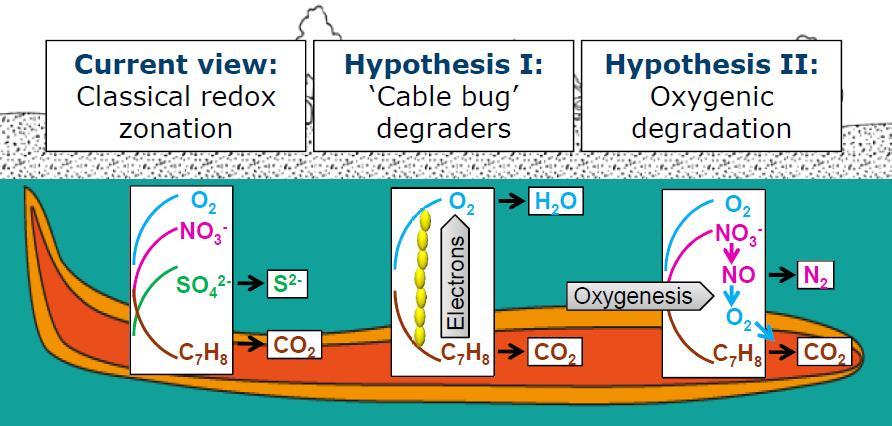SoilSystems (DFG SPP 2322, 1st phase 2021 - 2024)
Microbial life in soils requires energy delivered by the oxidation or organic substrates coupled to reduction of various electron acceptors. The transformation and storage of soil carbon, microbial bio- and necromass are subject to the laws of thermodynamics, but energy-based descriptions of this important global carbon pump are still largely missing. SoilSystems aims to generate such a thermodynamic description of energy and matter fluxes in soil. Within the project, the ÖMIK team proposes that microbial carbon use efficiency in soil can only be predicted when the chemical characteristics of the utilized substrates (oxidation state of C, No. of C atoms, functionalization) are considered; and that (II) the structural and physicochemical heterogeneities of the soil habitat can decrease substrate-dependent carbon use efficiency and thermodynamics. Embedded within the SPP, this project will make central and innovative contributions towards an improved quantitative understanding of carbon and energy fluxes in soil.
Project link: https://soilsystems.net/
CRC Microplastics (DFG CRC 1357, 1st phase 2020 - 2026)
Microplastics (MP) have been introduced into soils for decades. The effects that this causes at the soil-plant interface, in the rhizosphere, are largely unknown. In this project, together with Prof. Eva Lehndorff (https://www.bayceer.uni-bayreuth.de/bod/), we are investigating whether MP alters water, humus, and nutrient storage in agricultural soils, and to what extent rhizosphere microbes are affected. ÖMIK Ph.D. student Sulari Anthony and Aileen Jakobs is also is also developing an innovative new approach for the extraction and density-dependent fractionation of MP from soils via isopycnic ultracentrifugation. Within the CRC, we thus aim to make an important contribution to the elucidation of the effects of MP in agricultural systems.
Project link: https://www.sfb-mikroplastik.uni-bayreuth.de
Rhizotraits (BMBF Rhizo4Bio Project, 2020 - 2027)
The Rhizotraits Project is headed by Prof. Johanna Pausch (http://www.bayceer.uni-bayreuth.de/agroecology/) of the University of Bayreuth. We aim is to gain a systematic understanding of how rhizosphere traits impact soil-plant interactions and contribute to increasing the quantity and quality of crop yields under varying climatic conditions. Within the consortium, ÖMIK Ph.D. student Alica Heid and Nicolas Tyborski is systematically comparing rhizosphere microbiome composition and functional traits of modern and highly yield optimized maize varieties to that of old landraces. Our findings will be translated into recommendations for agricultural practices and plant breeding in order to increase the resilience to drought in modern cropping systems.
Project link: https://www.bayceer.uni-bayreuth.de/rhizotraits/
CRC Campos (DFG CRC 1253, 1st phase 2017 - 2021)
Diffuse pollution of soils, surface waters, and groundwater by a multitude of anthropogenic organic and inorganic compounds is a growing global concern. Despite decades of pollutant research, serious knowledge gaps exist concerning the fate and behavior of these pollutants on the landscape scale and their impact on water quality, ecology, and human health. The CAMPOS Project aims to identify landscape elements controlling the storage, biogeochemical transformation, or elimination of pollutants, and to identify the most important processes and their dynamics responsible for pollutant transformations in distinct landscape compartments. Within CAMPOS, ÖMIK Ph.D. student Zhe Wang is addressing the reactivity of microbial nitrogen cycling and nitrate elimination in agricultural headwaters.
Project link: https://uni-tuebingen.de/forschung/forschungsschwerpunkte/sonderforschungsbereiche/sfb-1253/
The POLLOX Project (ERC CoG, 2014 - 2020)
Two central paradigms are currently understood to control biodegradation in groundwater and sediments: (i) Redox gradients at contaminant plume fringes and interphases between compartments are ‘hot-spots’ of for pollutant breakdown, and (ii) biodegradation is primarily limited by local electron acceptor availability, in particular that of oxygen. The POLLOX project challenged these paradigms via a new perspective of the role of molecular oxygen in what is currently considered as pollutant degradation in anoxic compartments. We tested, whether filamentous Desulfobulbaceae, so-called “cable bacteria”, can directly or indirectly stimulate anaerobic pollutant oxidation via long-distance electron transfer across redox gradients. Second, we investigated whether oxygenase-dependent degraders, in absence of external oxygen, can still be active in reduced compartments via self-sustained oxygenesis by nitric oxide dismutation. Both scenarios offer exciting new strategies on how microbes can circumvent physical limitations (e.g. of mixing) in porous media.
